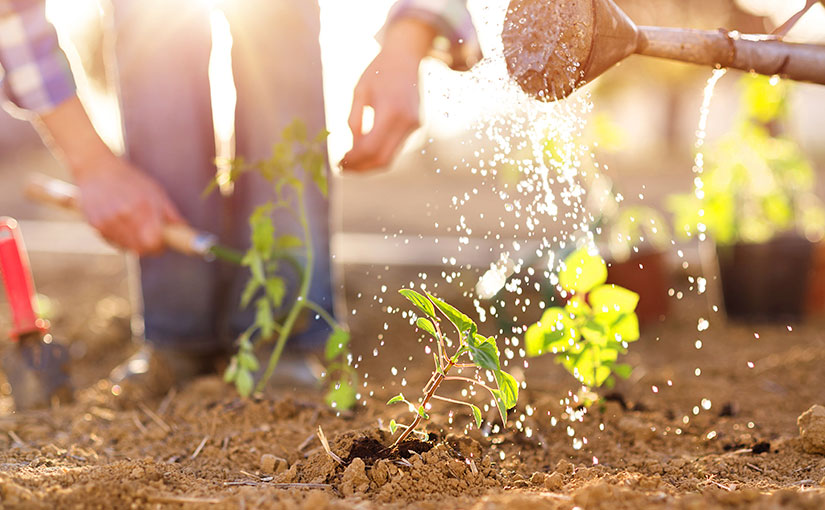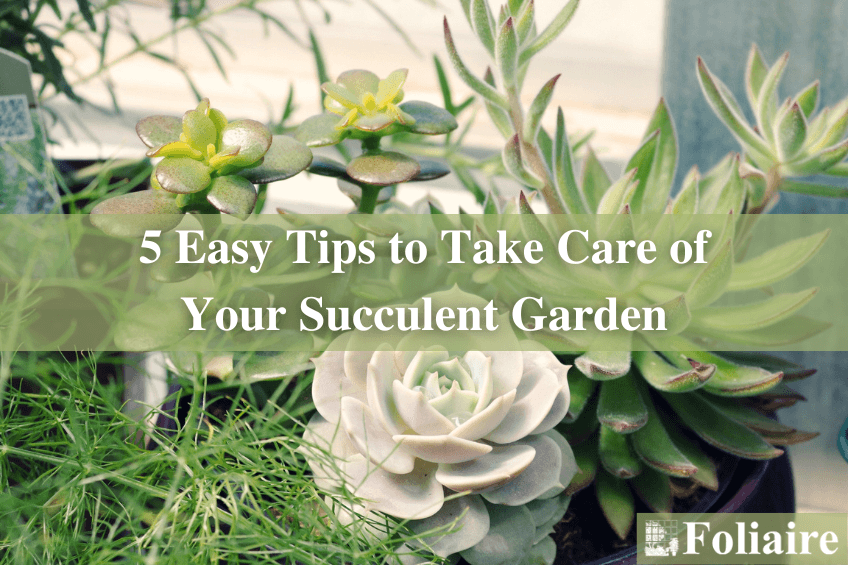Water adequately, create healthy soil, apply fresh mulch, and remove weeds to better care for your garden. These helpful tips will ensure the success and growth of your plants.

Essential Steps For Taking Care Of Your Garden
Taking better care of your garden requires following essential steps such as watering properly, creating healthy soil, applying fresh mulch, removing weeds, choosing local plants, and inspecting your plants often. By following these tips, you can maintain the health and beauty of your garden.
Inspect And Prepare Your Soil
Inspecting and preparing your soil is crucial to caring for your garden. Before you start planting, it’s essential to assess the quality of your soil. Take a close look at your soil’s texture, drainage, and pH level. Use a pH testing kit to determine if your soil is acidic, neutral, or alkaline. This information will help you understand what amendments or fertilizers to add to optimize the soil for your plants.
Once you have inspected your soil, it’s time to prepare it for planting. Begin by removing any weeds or grasses competing with your plants for nutrients and water. Loosen the soil using a garden fork or tiller to improve aeration and drainage. Add organic matter, such as compost or well-rotted manure, to enrich the soil and improve its fertility. Spread a layer of mulch over the soil surface to suppress weeds, retain moisture, and regulate soil temperature.
Water Properly And Regularly
Watering your garden correctly and regularly is essential for the health and growth of your plants. Different plants have different water requirements, so it’s necessary to research and understand the specific needs of the plants in your garden.
One of the most critical aspects of watering is providing the right amount of water at the right time. Overwatering can lead to root rot, while underwatering can cause wilting and stunted growth. Check the soil’s moisture level by inserting your finger about an inch deep into the soil. If it feels dry, it’s time to water it.
To ensure proper watering, drip irrigation or soaker hoses deliver water directly to the roots and minimize evaporation. Water your garden in the early morning or late evening, when the sun is not as intense, to prevent water loss through evaporation. Aim to provide consistent moisture to the plants without creating waterlogged conditions.
Handle Pests And Diseases
Dealing with pests and diseases is an inevitable part of gardening, but you can minimize their impact on your plants with proper care. Regularly inspect your plants for any signs of pests or diseases. Look for holes in the leaves, chewed edges, discoloured patches, or sticky residue, as these are indications of pest activity.
To control pests, consider natural or organic methods, such as handpicking or insecticidal soaps. Introduce beneficial insects, like ladybugs or lacewings, that prey on garden pests. If the infestation is severe, you may need to resort to chemical controls, but always follow the instructions carefully and use them as a last resort.
Preventing and managing diseases involves good sanitation practices. Remove any diseased or infected plant parts promptly to prevent the spread of pathogens. Provide adequate airflow around the plants by spacing them correctly. Avoid overhead watering, which can promote fungal diseases.
By inspecting your soil, watering properly, and handling pests and diseases effectively, you are taking essential steps to ensure the health and success of your garden. Remember, a well-maintained garden brings beauty to your surroundings and provides a rewarding experience for you as a gardener.

Improving Your Gardening Skills
Improve your gardening skills with these helpful tips for better care of your garden. Learn how to water correctly, create healthy soil, remove weeds, and maintain plant health. Also, consider trying raised beds and choosing local plants for optimal gardening success.
Experiment With Different Methods
Improving your gardening skills involves being open to experimenting with different methods. Each garden is unique, and what works for one person may not work for another. You can discover what works best for your plants and soil by trying different techniques and approaches.
One method to experiment with is companion planting. This involves growing different plants together that can benefit each other. For example, planting marigolds alongside vegetables can help deter pests. Research different companion plants and pair them in your garden to see the benefits.
Another technique to explore is vertical gardening. If you have limited space, vertical gardening allows you to use vertical surfaces such as walls or trellises. This can be especially useful for growing vine plants like tomatoes or cucumbers. Experiment with different structures and supports to see which works best for your garden.
Learn About Design
Gardening is not just about plants and soil but also about design. Learning about design can help you create a visually appealing and well-organized garden. Consider the layout of your garden, the flow of pathways, and the placement of different plants.
One design principle to keep in mind is the idea of focal points. Choose a specific area or object in your garden to draw attention to, such as a beautiful flowerbed or a unique sculpture. This can add visual interest and create a sense of balance in your garden.
Additionally, consider the colour palette of your plants. Choose complementary colours to create harmonious arrangements. For example, pairing purple flowers with yellow ones can create a vibrant and eye-catching display.
Read Different Advice
Continuous learning is essential to improving your gardening skills. There is always something new to discover and apply to your garden. Advice from experienced gardeners and horticultural experts can provide valuable insights and tips.
Look for reputable gardening books, magazines, and online resources that offer practical advice and expert knowledge. Consider joining gardening forums or online communities to connect with fellow gardeners and exchange ideas.
However, it’s important to remember that not all advice suits your garden and climate. Adapt the information you read to fit your circumstances and experiment to see what works best for you.
In conclusion, improving your gardening skills involves experimenting with different methods, learning about design, and reading various pieces of advice. By being open-minded and willing to try new approaches, you can enhance your gardening abilities and create a thriving and beautiful garden.
Ensuring A Successful Garden
When it comes to gardening, ensuring a successful garden requires careful planning and attention to detail. Following these helpful tips, you can set yourself up for gardening success and enjoy a beautiful and thriving garden.
Proper Positioning Of Plants
One of the most critical factors in a successful garden is ensuring that plants are positioned correctly. Different plants have different sunlight and shade requirements, so it’s essential to understand the needs of your plants and set them accordingly. For example, sun-loving plants should be placed in areas that receive full sunlight most of the day, while shade-loving plants should be placed in areas with partial or complete shade. Correctly positioning your plants ensures they receive the optimal amount of light they need to grow and thrive.
Providing Sufficient Space
Plants need sufficient space to grow and spread their roots without competition. Crowding plants too close together can restrict their growth and lead to nutrient deficiencies. Therefore, it’s essential to provide enough space between plants to allow for proper air circulation and to prevent overcrowding. This will help plants reach their full potential and reduce the risk of diseases and pests. Consult plant spacing guidelines or seek advice from local gardening experts to determine the appropriate spacing for your specific plants.
Soil Preparation And fertilization
Healthy soil is the foundation of a successful garden. Before planting, it’s essential to prepare the soil by removing weeds, rocks, or debris and loosening it with a garden fork or tiller. This will improve drainage and allow roots to penetrate easily. Additionally, add organic matter such as compost or well-rotted manure to enrich the soil, as this will provide essential nutrients and improve soil structure. Regular fertilizing is also crucial to replenish nutrients in the soil over time. Use organic or slow-release fertilizers specifically formulated for your plants’ needs.
Tip: Conduct a soil test to determine your soil’s pH level and nutrient deficiencies. This will help you make informed decisions about the type and amount of fertilizer to use.
By following these tips for ensuring a successful garden, you can create an environment that promotes plant health and growth. Remember to regularly inspect your plants for signs of pests, diseases, or nutrient deficiencies, and take appropriate action to address any issues promptly. With proper positioning, sufficient space, and attention to soil preparation and fertilizing, your garden will flourish and bring you joy all season.
Remember these tips as you plan and nurture your garden for a successful and rewarding gardening experience.

Frequently Asked Questions For Helpful Tips For Taking Better Care Of Your Garden
How can you help take care of the garden?
To help care for your garden: 1. Examine plants before buying to ensure they are healthy. 2. Use composted yard waste and avoid chemical fertilizers. 3. Monitor and control pests and clean up fallen leaves in the fall. 4. Apply the correct fertilizer and choose disease-resistant plant varieties.
5. Prune damaged limbs and choose appropriate plants for your garden.
How Can I Improve My Gardening Skills?
Try these tips to improve your gardening skills: 1. Experiment with different methods. 2. Learn about design. 3. Read up on different advice. 4. Sow your seeds properly. 5. Start tracking progress.
What Are The 4 Things To Remember When Planting A Garden?
When planting a garden, remember these 4 things: 1. Water properly. 2. Create healthy soil. 3. Apply fresh mulch. 4. Remove weeds.
How Do You Ensure A Successful Garden?
To ensure a successful garden, follow these guidelines: 1. Water properly. 2. Create healthy soil. 3. Apply fresh mulch. 4. Remove weeds. 5. Choose local plants. Inspect your plants often and maintain their health. Consider raised beds for easier gardening.
Conclusion
Taking better care of your garden doesn’t have to be a daunting task. By following the helpful tips mentioned in this blog post, you can ensure that your garden thrives and looks its best. Watering properly, creating healthy soil, removing weeds, and choosing local plants are just a few steps.
Maintaining plant health and trying to raise beds can also make a significant difference. Remember to inspect your plants often and make any necessary adjustments. With these tips, you’ll be on your way to having a beautiful garden that you can enjoy year-round.

Hi, I’m Esrat, and I’m so glad that you found me here at Happy Food Kitchen! I started Happy Food Kitchen in 2023 to have a creative, right-brained outlet to balance my very left-brained career in genetics.




